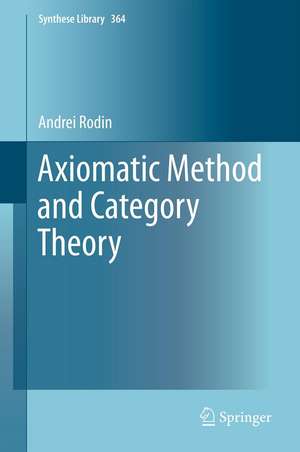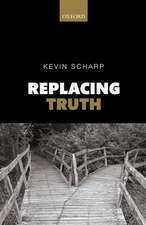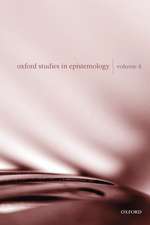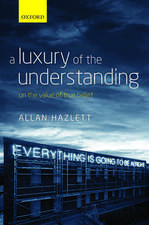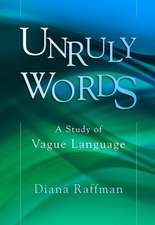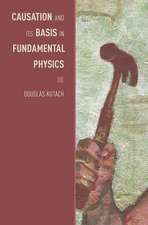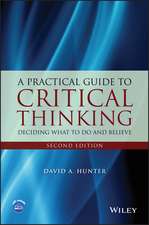Axiomatic Method and Category Theory: Synthese Library, cartea 364
Autor Andrei Rodinen Limba Engleză Hardback – 24 oct 2013
The author, a well-known philosopher and historian of mathematics, first examines Euclid, who is considered the father of the axiomatic method, before moving onto Hilbert and Lawvere. He then presents a deep textual analysis of each writer and describes how their ideas are different and even how their ideas progressed over time. Next, the book explores category theory and details how it has revolutionized the notion of the axiomatic method. It considers the question of identity/equality in mathematics as well as examines the received theories of mathematical structuralism. In the end, Rodin presents a hypothetical New Axiomatic Method, which establishes closer relationships between mathematics and physics.
Lawvere's axiomatization of topos theory and Voevodsky's axiomatization of higher homotopy theory exemplify a new way of axiomatic theory building, which goes beyond the classical Hilbert-style Axiomatic Method. The new notion of Axiomatic Method that emerges in categorical logic opens new possibilities for using this method in physics and other natural sciences.
This volume offers readers a coherent look at the past, present and anticipated future of the Axiomatic Method.
| Toate formatele și edițiile | Preț | Express |
|---|---|---|
| Paperback (1) | 684.03 lei 38-45 zile | |
| Springer International Publishing – 27 aug 2016 | 684.03 lei 38-45 zile | |
| Hardback (1) | 694.18 lei 38-45 zile | |
| Springer International Publishing – 24 oct 2013 | 694.18 lei 38-45 zile |
Din seria Synthese Library
- 15%
 Preț: 638.43 lei
Preț: 638.43 lei - 18%
 Preț: 989.98 lei
Preț: 989.98 lei - 15%
 Preț: 596.69 lei
Preț: 596.69 lei - 18%
 Preț: 903.93 lei
Preț: 903.93 lei - 15%
 Preț: 586.88 lei
Preț: 586.88 lei - 15%
 Preț: 696.50 lei
Preț: 696.50 lei - 18%
 Preț: 892.90 lei
Preț: 892.90 lei - 15%
 Preț: 643.34 lei
Preț: 643.34 lei -
 Preț: 282.33 lei
Preț: 282.33 lei - 5%
 Preț: 372.19 lei
Preț: 372.19 lei -
 Preț: 443.10 lei
Preț: 443.10 lei - 15%
 Preț: 637.59 lei
Preț: 637.59 lei - 18%
 Preț: 958.88 lei
Preț: 958.88 lei - 15%
 Preț: 642.36 lei
Preț: 642.36 lei - 18%
 Preț: 1230.66 lei
Preț: 1230.66 lei - 15%
 Preț: 642.83 lei
Preț: 642.83 lei - 18%
 Preț: 1000.39 lei
Preț: 1000.39 lei -
 Preț: 389.70 lei
Preț: 389.70 lei - 15%
 Preț: 637.28 lei
Preț: 637.28 lei - 18%
 Preț: 952.26 lei
Preț: 952.26 lei - 18%
 Preț: 1231.32 lei
Preț: 1231.32 lei - 15%
 Preț: 645.96 lei
Preț: 645.96 lei -
 Preț: 395.85 lei
Preț: 395.85 lei -
 Preț: 400.47 lei
Preț: 400.47 lei - 18%
 Preț: 1225.48 lei
Preț: 1225.48 lei - 15%
 Preț: 638.89 lei
Preț: 638.89 lei - 18%
 Preț: 1232.09 lei
Preț: 1232.09 lei -
 Preț: 380.45 lei
Preț: 380.45 lei -
 Preț: 394.87 lei
Preț: 394.87 lei - 15%
 Preț: 640.37 lei
Preț: 640.37 lei - 15%
 Preț: 639.08 lei
Preț: 639.08 lei -
 Preț: 381.98 lei
Preț: 381.98 lei - 15%
 Preț: 643.00 lei
Preț: 643.00 lei - 15%
 Preț: 672.29 lei
Preț: 672.29 lei
Preț: 694.18 lei
Preț vechi: 913.38 lei
-24% Nou
Puncte Express: 1041
Preț estimativ în valută:
132.84€ • 142.04$ • 110.75£
132.84€ • 142.04$ • 110.75£
Carte tipărită la comandă
Livrare economică 14-21 aprilie
Preluare comenzi: 021 569.72.76
Specificații
ISBN-13: 9783319004037
ISBN-10: 3319004034
Pagini: 300
Ilustrații: XI, 285 p. 63 illus.
Dimensiuni: 155 x 235 x 25 mm
Greutate: 0.59 kg
Ediția:2014
Editura: Springer International Publishing
Colecția Springer
Seria Synthese Library
Locul publicării:Cham, Switzerland
ISBN-10: 3319004034
Pagini: 300
Ilustrații: XI, 285 p. 63 illus.
Dimensiuni: 155 x 235 x 25 mm
Greutate: 0.59 kg
Ediția:2014
Editura: Springer International Publishing
Colecția Springer
Seria Synthese Library
Locul publicării:Cham, Switzerland
Public țintă
ResearchCuprins
Introduction.- Part I A Brief History of the Axiomatic Method.- Chapter 1. Euclid: Doing and Showing.- Chapter 2. Hilbert: Making It Formal.- Chapter 3. Formal Axiomatic Method and the 20th Century Mathematics.- Chapter. 4 Lawvere: Pursuit of Objectivity.- Conclusion of Part 1.- Part II. Identity and Categorification.- Chapter 5. Identity in Classical and Constructive Mathematics.- Chapter 6. Identity Through Change, Category Theory and Homotopy Theory.- Conclusion of Part 2.- Part III. Subjective Intuitions and Objective Structures.- Chapter 7. How Mathematical Concepts Get Their Bodies. Chapter 8. Categories versus Structures.- Chapter 9. New Axiomatic Method (instead of conclusion).- Bibliography.
Textul de pe ultima copertă
This volume explores the many different meanings of the notion of the axiomatic method, offering an insightful historical and philosophical discussion about how these notions changed over the millennia.
The author, a well-known philosopher and historian of mathematics, first examines Euclid, who is considered the father of the axiomatic method, before moving onto Hilbert and Lawvere. He then presents a deep textual analysis of each writer and describes how their ideas are different and even how their ideas progressed over time. Next, the book explores category theory and details how it has revolutionized the notion of the axiomatic method. It considers the question of identity/equality in mathematics as well as examines the received theories of mathematical structuralism. In the end, Rodin presents a hypothetical New Axiomatic Method, which establishes closer relationships between mathematics and physics.
Lawvere's axiomatization of topos theory and Voevodsky's axiomatization of higher homotopy theory exemplify a new way of axiomatic theory building, which goes beyond the classical Hilbert-style Axiomatic Method. The new notion of Axiomatic Method that emerges in categorical logic opens new possibilities for using this method in physics and other natural sciences.
This volume offers readers a coherent look at the past, present and anticipated future of the Axiomatic Method.
The author, a well-known philosopher and historian of mathematics, first examines Euclid, who is considered the father of the axiomatic method, before moving onto Hilbert and Lawvere. He then presents a deep textual analysis of each writer and describes how their ideas are different and even how their ideas progressed over time. Next, the book explores category theory and details how it has revolutionized the notion of the axiomatic method. It considers the question of identity/equality in mathematics as well as examines the received theories of mathematical structuralism. In the end, Rodin presents a hypothetical New Axiomatic Method, which establishes closer relationships between mathematics and physics.
Lawvere's axiomatization of topos theory and Voevodsky's axiomatization of higher homotopy theory exemplify a new way of axiomatic theory building, which goes beyond the classical Hilbert-style Axiomatic Method. The new notion of Axiomatic Method that emerges in categorical logic opens new possibilities for using this method in physics and other natural sciences.
This volume offers readers a coherent look at the past, present and anticipated future of the Axiomatic Method.
Caracteristici
Offers readers a coherent look at the past, present and anticipated future of the Axiomatic Method Provides a deep textual analysis of Euclid, Hilbert, and Lawvere that describes how their ideas are different and how their ideas progressed over time Presents a hypothetical New Axiomatic Method, which establishes closer relationships between mathematics and physics
